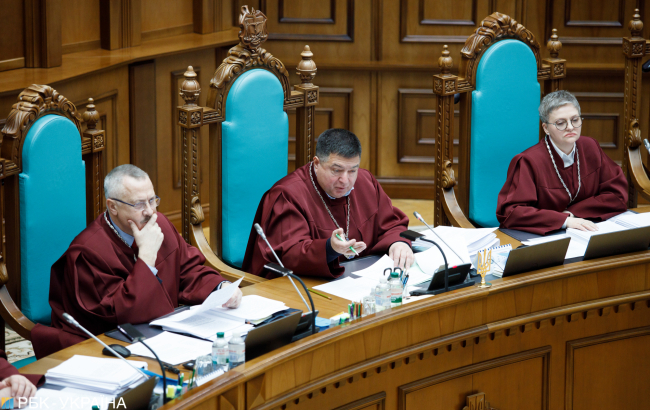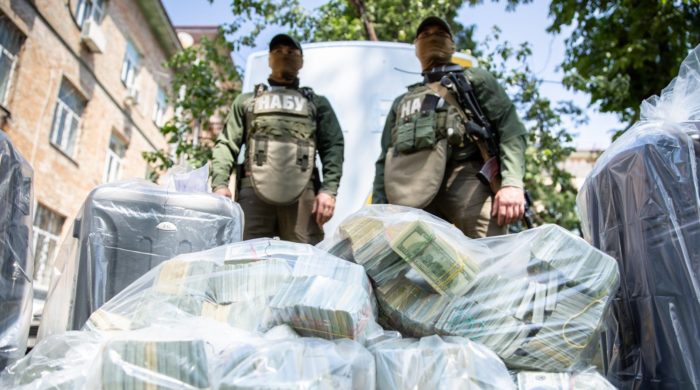"Should there be life imprisonment for large-scale corruption?" asked President Zelenskyy in a controversial unofficial poll held on local election day, 25 October.
Unsurprisingly, most - 83%, according to preliminary results - answered "yes."
Two days later, Ukraine's Constitutional Court all but killed the possibility of any kind of imprisonment for such corruption. Behind closed doors and away from the public eye, the court declared one of Ukraine's key anti-corruption achievements -- the online register of assets that top-officials were obliged to reveal, aka the e-declaration system, unconstitutional.
This unprecedented step not only torpedoes Ukraine's post-Euromaidan anti-corruption successes -- it endangers the next $5.5 bn IMF loan and the country's visa-free regime with the EU. And it's likely the story will be continued -- the Court might soon outlaw the creation of Ukraine's Anti-Corruption Court, a crucial anti-graft institution widely regarded as a success story.
The last two days have been tumultuous, and on the evening of 29 October, President Zelenskyy convened a meeting of the National Security and Defense Council to address the legal mayhem caused by the Court's decision, after which the Prime Minister ordered state agencies to ignore its decision.
Here is what you need to know about Ukraine's most pressing topic.
What did the decision change?
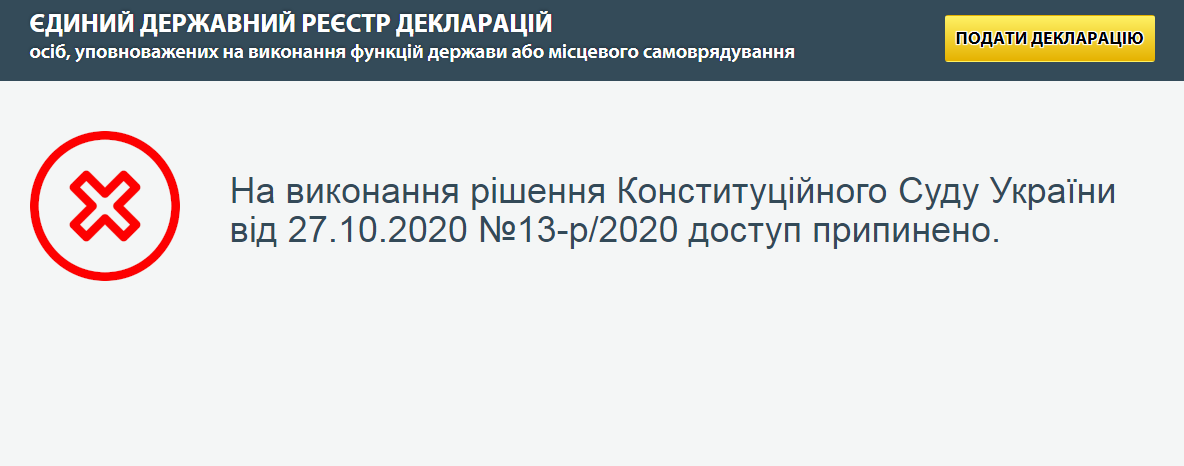
The text of the Court's decision appeared on 28 October. Vitaliy Shabunin, chairman of the Anti-Corruption Center, a leading anti-corruption NGO, explained the meaning of the decision thus:
"Judges of the Constitutional Court have allowed officials to legalize bribes [accumulated] since the [Euromaidan] Revolution of Dignity and to conceal illegally acquired property. Now officials can buy villas, castles, or other expensive things that do not fit into their official income or legalize the ones they bought before and not worry about punishment, because the judges of the Constitutional Court gave them an indulgence."
- Public access to the online registry of the asset declarations of officials has been terminated. It can now only be accessed by employees of the National Agency on Corruption Prevention (NAZK). one of the key institutions in the anti-corruption framework created after the Euromaidan revolution. Earlier, anybody could review the declarations; hundreds of anti-corruption investigations by activists, journalists, and law enforcers were based on them. The Anti-Corruption Court started issuing verdicts for deliberate deception in the declarations.
- Officials lying about their assets won't be punished. The Court canceled not only criminal, but also administrative and disciplinary liability for knowingly false income declarations. So far, 5 out of the 21 verdicts issued by the High Anti-Corruption Court were issued for this violation, and 13 are being reviewed at present, including such scandalous figures as the Odesa mayor Hennadiy Trukhanov and ex-energy minister Ihor Nasalyk. All of them will now be let off the hook. Moreover, the National Anti-Corruption Bureau informed that 110 criminal cases it is investigating will now be closed. Additionally, the Court removed the obligation for officials to inform about the assets of their closest relatives.
- No more controls for e-declarations and conflicts of interest. Although NAZK employees can still see the declarations of officials, this does not matter: the Court struck down the Agency's authority to act in any way. Gone are the days when investigative journalists could inform NAZK about the illegal assets of state officials, as NAZK is prohibited from receiving any information on violations from activists or state organs; moreover, the Agency can no longer direct any protocols and conclusions about the corruption of state officials to courts or the state. Further, it can no longer regulate conflicts of interest - and that means nothing can prevent, for example, a judge from making a decision in favor of the business of his wife. The NAZK has essentially been gutted, and the little authority it has left will be impossible to effectuate.
"The NAZK, which was formed primarily to verify the declarations of officials and control conflicts of interest in their activities, has lost most of its powers and rights to do so. This effectively prevents any effective operation of this body," the Anti-Corruption Action Center summed up in a statement.
Complying with the decision, NAZK, shut down its online e-declaration register at 18:00 of 28 October. NAZK head Oleksandr Novikov told Ukrainska Pravda that
"This decision ... sends Ukraine back not to 2013, but 1991, when anti-corruption legislation did not exist in principle. It completely abolishes all anti-corruption mechanisms that have been built during the years of independence."
As well, by this decision, the Constitutional Court blocked the implementation of the results of the local elections which took place on 25 October. Novikov explained that as the NAZK no longer has access to the state registers needed to inspect the declarations of the candidates, no heads of a state body can not be officially appointed.

What were the arguments of the Court?
"This was such a blatant and horrible decision -- nobody expected it," Mykhailo Zhernakov, Director of the DEJURE foundation, told Euromaidan Press.
His organization published a legal analysis of the ruling, according to which the court's decision boils down to three arguments:
- The judiciary must be independent, so any influence on it, including by the government, is unconstitutional;
- Verification of declarations and the lifestyle of judges is good, but it should be carried out only by the judiciary because if the NAZK does that, it actually controls the judiciary;
- Submitting knowingly inaccurate information in the declaration is not socially dangerous enough to lead to criminal liability.
That the judiciary should be independent is indeed a constitutional principle: it means that judges should make decisions on firing and appointing judges to the highest courts, not the government or parliament. But the statement that any influence on the judiciary is unconstitutional is absurd: the three branches of power -- the judicial, executive, and legislative -- constantly interact in a system of checks and balances.
The Constitution indeed prohibits "influencing a judge," but not the judiciary as a whole. Moreover, the independence of the judiciary does not mean it cannot be held accountable before society. On the contrary, if it is not held accountable, judges will become isolated from the rest of society and the judiciary will morph into a corporation, DEJURE explains.
It only explicitly mentioned one clause, article 366-1 of the Criminal Code, arguing that criminal liability for knowingly false declarations is excessive and the negative consequences for the person are disproportionate to the harm inflicted - but did not explain what the harm and negative consequences could be, or when they could be considered excessive.
Can the anti-corruption laws be reworked, taking into account this decision of the Court?
The short answer is no. As the Court did not explain why it finds the clauses it is striking down unconstitutional, nobody knows what the problem with them is. This, in turn, makes any possibility of reintroducing them problematic: the court might strike down any similar laws, citing its previous decision. Therefore, it is impossible to prepare any new laws taking into account the position of the Court.
[editorialright]
The High Council of Justice is one of the two bodies of judicial self-government in Ukraine that Zhernakov accuses of serving the interests of politicians and oligarchs and persecuting independent judges. Judicial experts believe that the only way to reform Ukraine's judiciary is to reboot
these bodies.
[/editorialright]
"It's difficult to take into account the Court's position, because there is no position as such, except that any control of the judiciary from outside the judiciary is unconstitutional (which is nonsese). Correspondingly, any control mechanism -- NAZK, the National Anti-Corruption Bureau, the Public Integrity Council -- has been outlawed. The Court believes that any control can come only from within the judiciary, like the High Council of Justice. And we all know how that works," Mykhailo Zhernakov told Euromaidan Press.
Who is responsible for the decision?

The judges
11 judges of the Constitutional Court voted to strike down the anti-corruption legislature, ignoring the arguments of anti-corruption organs and civic society. At least four of them had a conflict of interest in the case.
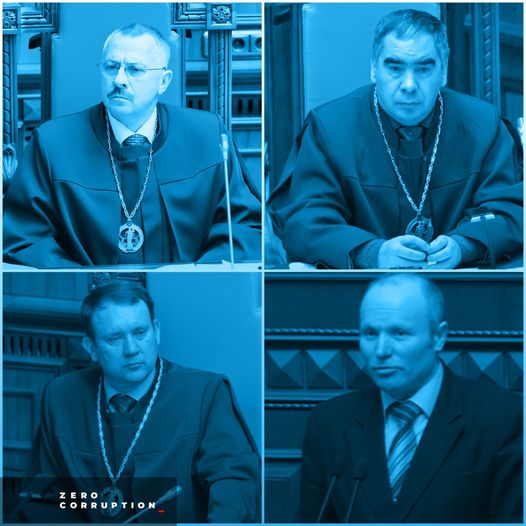
Admirably, four judges voted against. Two of them explained why: in statements published on the website of the Court, judge Serhiy Holovatyi and Vasyl Lemak stated that the decision was "legally unjustified."
MPs who authored the submission to the Constitutional Court
Most of them are MPs from the pro-Russian "Opposition Platform-For live" and fraction "For the future" controlled by oligarch Ihor Kolomoiskyi. These factions consistently attack Ukraine's pro-western course, seeking to drive it closer to Russia. And destroying the anti-corruption infrastructure is a major step in this direction.
Moreover, at least seven of these MPs had problems with NAZK themselves. They include Putin's main Ukrainian crony Viktor Medvedchuk, who failed to declare a $200 mn yacht, hectares of the Bulgarian coast, and over 20 real estate objects in Ukraine.
Zelenskyy and the President's Office
Vitaliy Shabunin is adamant
that there are three powers behind the Court's decision: the Kremlin and Kolomoiskyi, Head of the President's Office Andriy Yermak and his deputies Oleh Tatarov and Andriy Smyrnov, and Zelenskyy himself.
Several experts questioned by hromadske were unanimous that the President's Office had a role in the story. One of those interviewed told that it was Smyrnov who promoted the idea of taking down the anti-corruption legislature; another assured that such decisions did not happen without "calls from the President's Office."
What is at stake?
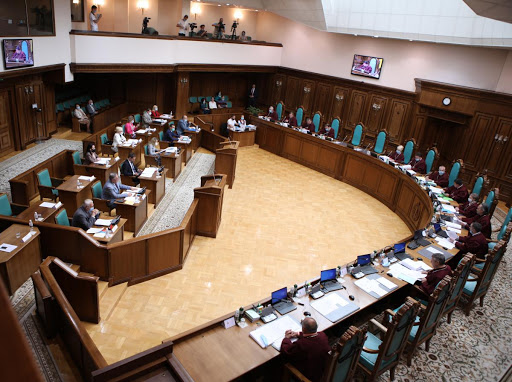
Mykhailo Zhernakov is confident that the decision was ordered and controlled; an indirect proof for this is the fact that the Court was extraordinarily fast in reviewing the application of the MPs, which was submitted only in August. Such cases usually drag on for years.
"This decision could not be accidental; Kolomoiskyi and the Kremlin are behind it. The goal is to stop Ukraine's integration with the West," Zhernakov told. "The anticorruption infrastructure killed by the Constitutional Court is the cornerstone of our collaboration with the EU and the western world. It was a condition for the visa-free regime; the EU and the Western world have invested a lot of money and effort into it. Now these things are ruined, it's an obvious failure to fulfill obligations."
Should the IMF terminate its cooperation with Ukraine after this violation and not provide Ukraine the $5.5 bn loan it desperately needs, Ukraine's only hope would be to turn to Russia, which is attempting to reverse Ukraine's pro-western turn with a war dragging into its seventh year. This is, apparently, in the interests of Kolomoiskyi:
"Recall Kolomoiskyi's words: 'Let's get a $100 bn loan from Russia'; 'Give it 5, 10 years, and the blood will be forgotten.' Obviously, Kolomoiskyi is not interested in this anti-corruption infrastructure, he is more interested in Ukraine not having these obligations, in Ukraine being able to receive this money and steal it."
So far, the EU has carefully hinted that Ukraine's visa-free regime, touted as a major victory on the country's path to eurointegration, is indeed at stake.
A letter by Ukraine's ambassador to the EU Mykola Tochytskyi states that the decision of the Constitutional Court is "a sufficient basis for the European Commission to launch a mechanism for the temporary suspension of the visa-free regime" -- as Ukraine has withdrawn from the criteria as a result of which the visa-free regime was introduced.
The G7 Ambassadors have also issued a careful warning:
— G7AmbReformUA (@G7AmbReformUA) October 29, 2020
Surely, Ukraine's western prospects are endangered. But perhaps more important are the consequences for Ukrainian society itself. Since 2014, after the Euromaidan revolution, Ukraine gradually drifted away from its corruption-riddled past. Some steps were visible, some not, some were discredited in the eyes of society by the oligarchic media.
However, until the recent Constitutional Court decision, Ukraine could still say it was moving forward in its anti-corruption efforts. Now nobody knows what lies ahead -- as at any time, any reform might be outlawed as unconstitutional.
Essentially, the Court declared a war against the Ukrainian people.
What now?
The Constitutional Court's decision has prompted criticism from many Ukrainian authorities.
The decision had been criticized by Ukraine's Foreign Minister Dmytro Kuleba and National Defense and Security Council secretary Oleksiy Danilov. Chairman of the Verkhovna Rada Dmytro Razumkov said that the parliament and president should decide how to ensure that the anti-corruption system keeps working by refining the existing mechanisms on a legislative level. And President Zelenskyy promised that the e-declaration system will keep working.
But the problem with the Constitutional Court extends beyond this decision. The real problem lies within the Court, and the Ukrainian judiciary overall.
As part of the judicial reform endeavors launched after Euromaidan, changes to the Constitution were adopted to ensure that judges would be selected to the Court after a contest. But the rules of the contest described in the corresponding law are flawed; they did not upend the judges' political dependency.
That is why DEJURE proposes to initiate a new procedure of selecting the judges, to make sure they are honest and have integrity.
Meanwhile, a protest in front of the Court is scheduled for Friday. It is organized by the Anti-Corruption Action Center, DEJURE, Automaidan, and the Capitulation Resistance Movement.
More about how to fix Ukraine's judiciary:
Corrupt and biased judges still pollute Ukraine’s judiciary; Zelenskyy’s reform will not fix this

